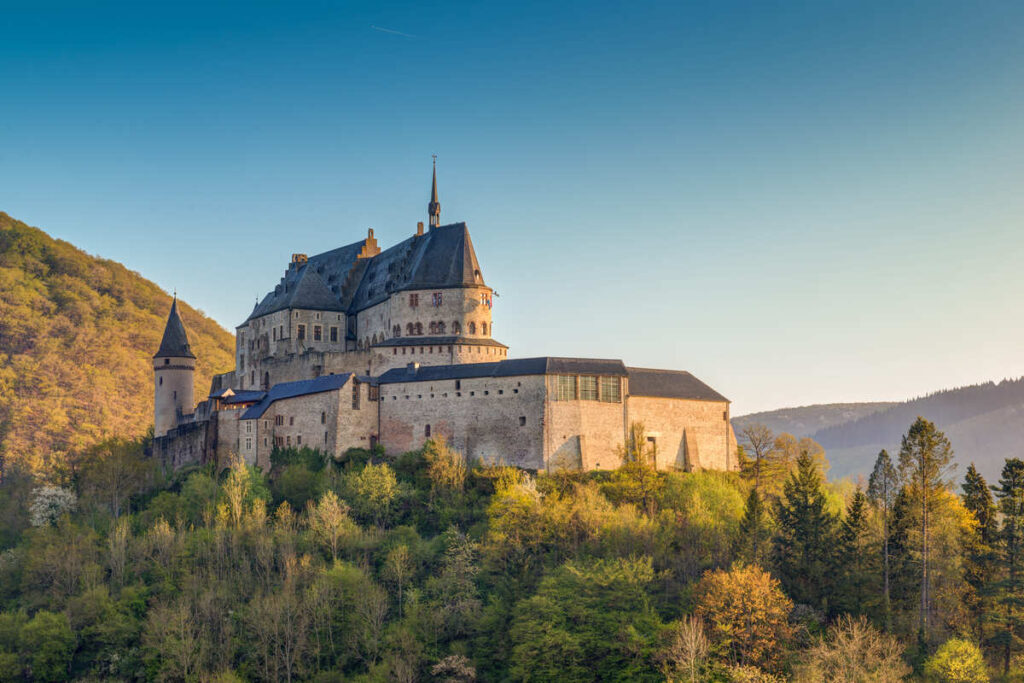Travel Guide
You Can Travel Around This Medieval European Country By Train For Free This Summer
Last Updated
The land of fairytale castles, gorgeous cities with origins lost to time, and housing millennia-old treasures, Europe is the end goal of every culture buff this summer.
While most travelers will be flocking to France, Spain, and Italy, there’s one medieval European country that remains largely overlooked.
Unlike your usual sunny hotspots, it sees smaller to no crowds over the peak season and offers free train travel.

You read that right: as an American, you can move around without spending a single penny on public transportation, and you don’t even need to book seats in advance.
First come, first served.
Dear fellow off-path explorers, welcome to Luxembourg:
Luxembourg Is One Of The Prettiest Countries In Europe
Luxembourg is a small European country—one of the smallest, at that—approximately the size of the U.S. state of Rhode Island.
It is located at the crossroads of Central Europe, sandwiched between the much-larger Belgium, France, and Germany.

Officially a duchy, headed by a Grand Duke, Lux (as it is commonly called) has had a significant role to play over the years, despite its relative anonymity in the wider continent: it is officially a ‘capital’ of Europe, housing a number of European institutions.
These include the Court of Justice of the European Union, the European Court of Auditors, the European Investment Bank, and many others, but there’s more to this tiny nation of just over 650,000 inhabitants than politicians in suits and business moguls:

It is a culturally charged territory that has, for much of its History, been claimed by France and Germany before finally establishing itself in the modern era as an independent state. As a result, it combines the very best of both cultures.
Natives speak Luxembourguish, a minority language closely related to German, though they’re perfectly fluent in French and English.
Both serve as lingua franca on the streets, especially among foreigners who live in the Grand Duchy (and that’s almost half the population).
A Well-Preserved Medieval Capital

Luxembourg City is the national capital, and its Old Quarters and fortifications are a UNESCO World Heritage Site.
With its deserted cobbled alleys, street-corner boulangeries serving Franco-German delicacies, vast verdant parks, and imposing fortifications, it barely feels like a modern capital.
‘The City’ is one of the best-preserved medieval gems of Europe.
Its Germanic Old Town—called Grund—is located at the confluence of the scenic Alzette and Pétrusse Rivers, at the foot of a 15th-century fortress.

These fortifications are the reason why Luxembourg was so coveted by foreign powers, as it was once a military fort and the most impenetrable of its kind, and it’s perhaps the only European castle that never succumbed to invaders:
It’s lying in ruins nowadays, but it was torn down by the Luxembourgish themselves in the 19th century following a Peace Treaty that would ensure the country would adopt a state of perpetual neutrality, much like Switzerland.
That’s partly why it’s so peaceful and prosperous: Luxembourg has very low crime rates, it’s one of the wealthiest states in the world.
What Else To See Outside The City?

Outside The City, there are smaller historic towns that are just as quaint, such as Vianden in the north, famous for its Disney-like castle, Echternach, the country’s oldest, home to a 7th-century abbey, and Larochette, dominated by a partly-ruined hilltop citadel.
Visitors should also make sure they stop by Schengen, a wine-making village on the banks of the Moselle, near the tripoint where France, Germany and Luxembourg meet, where—surprise, surprise—the the Schengen Agreement that abolished intra-European borders was signed.

Luxembourg may be compact in size, but it doesn’t mean nature isn’t abundant, with meandering rivers reaching remote settlements, crystal-clear lakes and waterfalls, and hikes leading to epic lookouts distributed across three nature reserves: Öewersauer, Our and Mëllerdall.
In fact, it has one of the densest networks of hiking trails in the continent, and if you’re feeling particularly adventurous, there’s nothing stopping you from walking the length of Luxembourg on the Escapardenne Lee Trail, taking three days to complete.

Of course, you can always catch the train as it’s free, anyway.
Tourists Can Use Public Transportation For Free In Luxembourg
Now, here’s the most amazing thing about Luxembourg: many visitors to Europe are not aware that public transportation is entirely free across the Grand Duchy, both for residents and tourists alike.
Since 2020, you’re allowed to board buses, trams, trains, and any other local mode of transport inside Luxembourg without booking a ticket, or even booking in advance.

For instance, when traveling from Luxembourg to Vianden, you can catch the next train to Ettelbruck, the nearest town to Vianden with a train station.
Once there, switch to local bus number 181, which will take 25 minutes to reach your final destination.
The total journey length is only an hour, and there is no need to make reservations for any trains or buses you’ll be using along the way.
Similarly, to travel from The City to Larochette, you can take the Diekirch-bound train, getting off at Mersch, where you’ll switch to bus number 233. Larochette is then the sixth stop on the way to Stegen, and the trip takes 47 minutes in total.

To reach the waterfall-dotted Mëllerdall Reserve, you’ll take the train to Mersch again, except this time it’s bus 232 you’re looking for.
The closest bus stop to Mëllerdall is Waldbillig, a short 25-minute walk through lush green forests to the park’s main entrance. From the capital, the entire trajectory (train to Mersch, bus to Waldbillig, final walk to the park) takes an hour and a half.
As you can see, regardless of where you’re going in Luxembourg, it is unlikely to take longer than an hour to get there from the capital, and every major town, nature park and tourist attraction is served by trains or buses, making it extremely easy (and cost-free) to get around without a car.

Public transportation may be free, but accommodation is certainly not, so don’t go thinking Luxembourg is a budget-friendly destination: quite on the contrary.
Par contre… Luxembourg Isn’t Cheap
This is one of the wealthiest countries in the world, remember?
And living costs reflect the high purchasing power of the population: prepare yourself to spend, on average $86 on meals daily, and as much as $190 on hotels per night.
You can, of course, travel to Luxembourg for much cheaper than that.

There are hostels in the Grund with dormitory beds from $61 per night (still incredibly pricey), but they’re usually very comfortable and could help you save up money if you’re on a shoestring budget.
Instead of eating out at restaurants every day, you can use the communal kitchen at your hostel to cook, too, or even grab quick eats at supermarkets: sandwiches are between $4 and $7, a bottle of inexpensive orange juice is around $4, and sparkling water is $3.
Hey, you can’t have it all. At least you can move around for free.
↓ Join Our Community ↓
The Travel Off Path Community FB group has all the latest travel news, conversations, and Q&A’s happening daily!

SUBSCRIBE TO OUR LATEST POSTS
Enter your email address to subscribe to Travel Off Path’s latest breaking travel news, straight to your inbox.
This article originally appeared on TravelOffPath.com
Opinions expressed here are the author’s alone, not those of any bank, credit card issuer, hotel, airline, or other entity. This content has not been reviewed, approved or otherwise endorsed by any of the entities included within the post.
Source link

